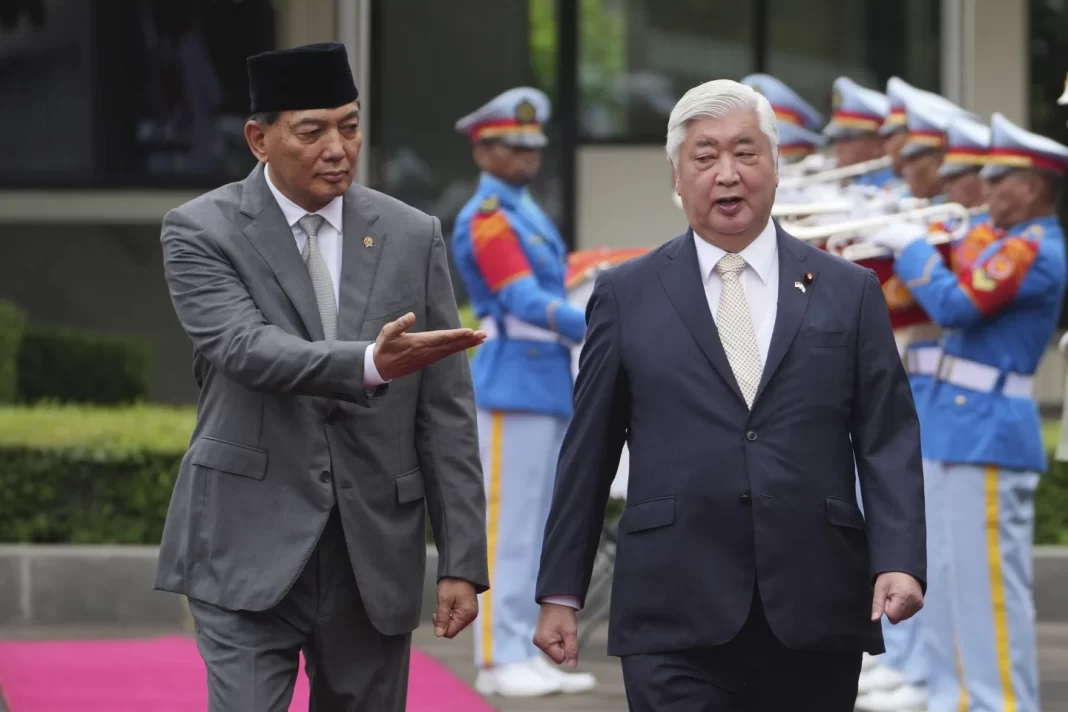Efforts to Strengthen Defense Ties
Indonesia and Japan have agreed to restart stalled discussions on the joint development of naval vessels and military equipment. This decision was made during a meeting on Tuesday between Indonesia’s Defense Minister Sjafrie Sjamsoeddin and Japan’s visiting Defense Minister Gen. Nakatani. Both nations aim to deepen their defense partnership amid growing regional security challenges.
The discussions included the possibility of jointly developing frigates and other military technologies. The move is seen as a step toward enhancing maritime security in Southeast Asia and boosting the capabilities of both countries’ naval forces.
Focus on Joint Naval Development
At the heart of the talks was Japan’s proposal to resume negotiations for developing frigates based on the Mogami-class design. These advanced naval ships are designed for efficiency, requiring a crew of only 90, which is half the number needed for conventional destroyers. Indonesian President Prabowo Subianto, who has prioritized military modernization, has previously shown interest in this initiative.
Under Japan’s strict guidelines for the transfer of defense equipment, exporting fully assembled ships is not an option. Instead, joint development has emerged as the most feasible way to transfer technology and strengthen ties. Discussions will continue to determine the specifics of the collaboration, including whether it will involve ships or other military equipment.
Historical Challenges
Negotiations on joint development projects faced setbacks in recent years, primarily during the administration of Indonesia’s former President Joko Widodo. A significant factor was Indonesia’s financial focus on relocating its capital city. This major undertaking diverted resources and attention away from defense initiatives.
Despite these delays, Japan remains committed to reestablishing and strengthening defense relations with Southeast Asia’s largest economy. This renewed collaboration reflects shared interests in maintaining regional security, particularly in strategically vital sea lanes.
Regional and Global Implications
Japan’s defense initiatives extend beyond Indonesia. Similar proposals for joint naval development have been made to Australia and Germany, with Canberra expected to make a decision later this year. These partnerships highlight Japan’s broader strategy to enhance maritime security in collaboration with like-minded nations.
Indonesia, located in a critical maritime region, sees this partnership as an opportunity to bolster its naval strength. Defense Minister Sjamsoeddin emphasized the need to explore further avenues of cooperation, including technology transfer and maritime security.
Building Long-Term Cooperation
The defense meeting also laid the groundwork for broader consultations on mutual maritime security. Both ministers agreed to establish mechanisms for regular discussions on defense equipment and technology. This initiative aims to address shared security concerns and enhance inter-operability between the two nations’ armed forces.
Indonesia has ambitious plans to modernize its military under President Subianto. These include acquiring submarines, frigates, and fighter jets. Strengthening defense ties with countries like Japan aligns with these goals and positions Indonesia as a key player in regional security.
Future Meetings and Diplomatic Engagement
Nakatani’s visit to Indonesia is part of a broader effort to deepen Japan’s engagement with Southeast Asia. Before returning to Tokyo, he will meet Indonesian President Subianto to discuss defense priorities and other areas of collaboration.
This visit also serves as a prelude to an upcoming meeting between President Subianto and Japanese Prime Minister Shigeru Ishiba. The high-level talks are expected to further solidify the defense partnership between the two nations.
Significance of the Partnership
The revival of defense talks underscores the strategic importance of Southeast Asia in global security. For Japan, strengthening ties with Indonesia is crucial for safeguarding its sea lanes and countering regional threats. For Indonesia, collaboration with Japan offers access to advanced technology and resources needed to modernize its military.
As both nations move forward with these discussions, the partnership promises to enhance maritime security and contribute to peace and stability in the region. The renewed focus on defense cooperation marks a significant step toward achieving these shared goals.

